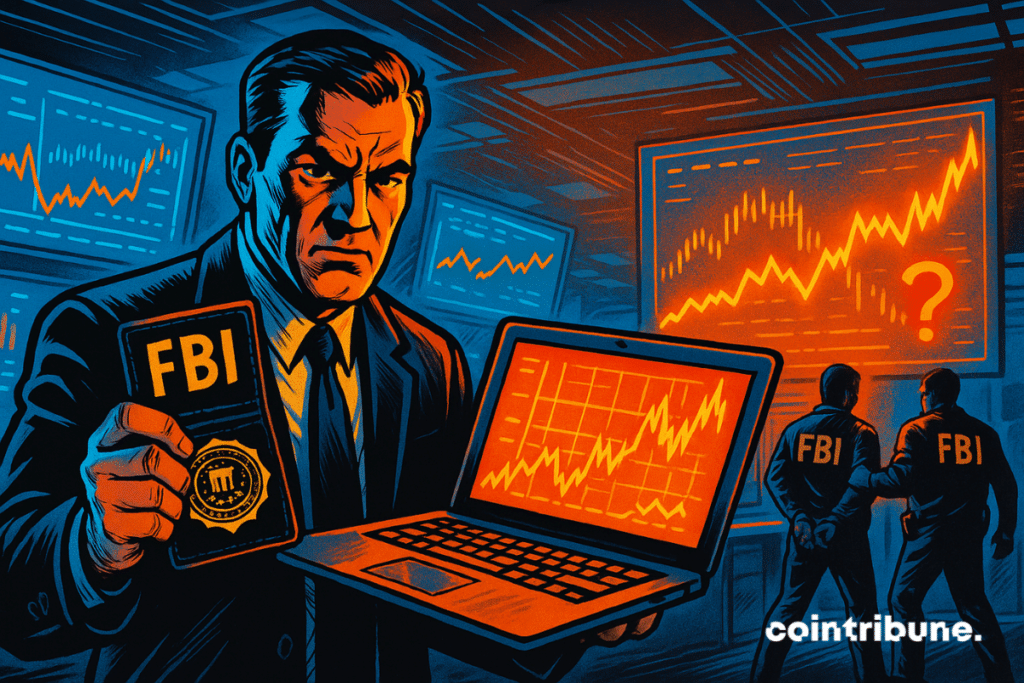FBI Arrests Ignite Scrutiny of Prediction Markets as Regulators Struggle to Keep Pace
A sweeping FBI operation that led to the arrest of an NBA player and coach last week has shaken both the sports and financial worlds. The incident comes as major leagues and betting platforms move deeper into prediction markets. Notably, the scandal has reignited debate over whether regulators are prepared to handle this new frontier of sports speculation.

In brief
- A major NBA betting scandal sparks fears over manipulation as prediction markets go mainstream.
- Experts warn the CFTC lacks staff and tools to monitor fast-growing sports prediction platforms.
- Self-regulated markets create risks of insider trading and weak enforcement against misconduct.
- Blockchain transparency offers promise but may also open new doors for insider activity and abuse.
Sports Leagues Go All In on Prediction Markets
The arrests mark one of the largest sports betting scandals in recent memory, with allegations of game manipulation to influence betting outcomes. The timing couldn’t have been more critical, as just a day earlier, the NHL became the first major U.S. sports league to sign a licensing deal with a prediction market platform.
Soon after, sports betting giant DraftKings announced its acquisition of a prediction market company, signaling the sector’s arrival in the mainstream. Yet as professional leagues and sportsbooks embrace prediction markets, federal regulators now face the challenge of policing a rapidly expanding and increasingly complex ecosystem.
Experts warn that these platforms—some of which are decentralized—could become breeding grounds for insider trading. Others argue that the transparency inherent to blockchain technology may ultimately reduce misconduct.
Prediction markets allow users to buy and sell contracts tied to future events, such as sports results or political outcomes. They are regulated not by state gambling commissions but by the Commodity Futures Trading Commission (CFTC), a small federal agency traditionally tasked with overseeing agricultural and financial derivatives.
Now, the CFTC finds itself responsible for monitoring not only prediction markets but also much of the cryptocurrency industry—despite limited staff and funding. One former CFTC official described the agency’s position as untenable.
I think the CFTC is going to get swallowed. You’re going to see more insider trading cases on these platforms because the CFTC isn’t doing active surveillance—they don’t have the manpower.
Former CFTC official
Unlike state gaming regulators, which maintain active oversight and closely cooperate with law enforcement, the CFTC relies heavily on whistleblowers and on self-reporting by the companies it supervises. That system works for traditional commodities but may falter in the fast-moving world of prediction markets and sports betting.
CFTC Faces Mounting Pressure to Oversee a New Market
The agency’s ability to adapt appears limited, with leadership turmoil having left it short-handed. At the same time, a broader government shutdown has further slowed its operations.
The collapse of Brian Quintenz’s nomination to lead the CFTC—following public disputes with crypto billionaires Tyler and Cameron Winklevoss—has only deepened uncertainty. Critics opposed his proposal to expand the agency’s budget, claiming it would lead to “regulatory capture.”
Legal experts say the CFTC’s lack of sports-specific rules represents a serious gap. Daniel Wallach, a lawyer specializing in sports and gambling law, explained that, unlike state-level betting laws, federal commodities rules offer no safeguards against insider activity in sports markets.
Regulatory Gaps Fuel Concerns Over Insider Activity
Wallach added that under the CFTC’s oversight, prediction market platforms largely regulate themselves. They create and approve their own event contracts and conduct internal integrity checks—a setup he said poses clear risks to fair and transparent operations.
Why Experts Are Concerned:
- Regulatory gap: Prediction markets fall under federal commodity laws rather than state gambling laws.
- Limited oversight: The CFTC lacks the manpower and tools to detect insider trading effectively.
- Rapid growth: The market’s size and complexity have outpaced regulators’ ability to adapt.
- Incentives for manipulation: Players or insiders could profit from non-public information.
- Self-regulation risks: Companies set their own integrity standards with minimal government scrutiny.
Despite these challenges, the prediction market industry continues to grow at an unprecedented pace. Last week alone, trading volume across the top four platforms—Kalshi, Polymarket, Limitless, and Myriad—surged to $2 billion. Analysts expect the sector to reach $95 billion in value by 2035, with Kalshi and Polymarket projected to dominate market share.
Kalshi, which operates legally under CFTC supervision, insists it has safeguards in place. A company spokesperson said Kalshi employs internal systems to flag suspicious activity and partners with integrity firm IC360. According to the spokesperson, the platform strictly prohibits insider trading and enforces policies to prevent unfair market activity.
Still, critics argue that without active government enforcement, even well-intentioned platforms will struggle to maintain fair play. Wallach noted that these for-profit operators face little direct oversight, allowing them to set and enforce their own rules—an arrangement that raises concerns about accountability and fairness.
Blockchain Transparency in Prediction Markets: Solution or New Risk?
Meanwhile, proponents of blockchain-based prediction markets point to transparency as a potential solution. Platforms like Polymarket record all transactions publicly on the blockchain, allowing anyone to trace trades in real time.
Marcin Kazmierczak, co-founder of RedStone, an oracle network used by Polymarket, said this model offers a natural deterrent.
Transparency alone doesn’t prevent insider trading, but it enables detection at a scale and speed traditional systems can’t match.
Marcin Kazmierczak
Coinbase’s legal chief, Paul Grewal, echoed that view, arguing that on-chain prediction markets could better expose and deter misconduct than traditional betting systems.
Still, recent incidents have raised doubts. Earlier this month, users on Polymarket appeared to correctly predict the Nobel Peace Prize winner hours before the official announcement, triggering an inquiry by Norwegian authorities. Polymarket did not condemn the trades; instead, it highlighted the controversy as proof of its predictive accuracy.
The company, now preparing to relaunch in the U.S. after a previous CFTC enforcement action, declined to comment on its internal policies. Both Polymarket and Kalshi share a connection in the political sphere. Each firm is advised by Donald Trump Jr., highlighting how deeply prediction markets have become intertwined with power and influence.
Maximize your Cointribune experience with our "Read to Earn" program! For every article you read, earn points and access exclusive rewards. Sign up now and start earning benefits.

James Godstime is a crypto journalist and market analyst with over three years of experience in crypto, Web3, and finance. He simplifies complex and technical ideas to engage readers. Outside of work, he enjoys football and tennis, which he follows passionately.
The views, thoughts, and opinions expressed in this article belong solely to the author, and should not be taken as investment advice. Do your own research before taking any investment decisions.